Athemos is a game produced in the McClure GRID Lab by students in the McClure School. The game was made for middle school aged students who may struggle with attention deficit and hyperactivity disorders. The 3D space shooter is comprised of players defending the earth from asteroids sent by alien drones from space. Students’ tasks include battling aliens, gathering intel during combat, mining for resources, and completing puzzles. Athemos concentrates on expanding students’ academic skills such as organization, note taking, study strategies and assignment tracking.
Projects
The GRID Lab works on a variety of projects from video games to Virtual Reality experiences. Those new to the GRID Lab and ECT curriculum may at first assume that the uses of VR and game development are limited, but the GRID Lab has worked to expand that notion, pushing the uses of VR and games into fields such as education, health, training, and much more.
Exploring New Possibilities
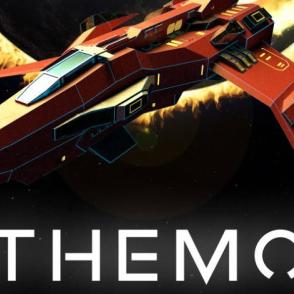
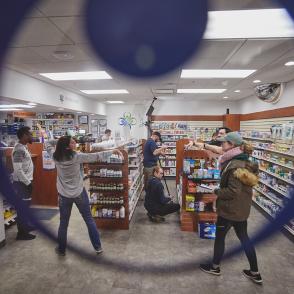
The Medicaid Simulation Project started ELI (Elderly, LGBTQ+ and Intimate partner violence) to educate future health care professionals about the different circumstances they will face in the field. ELI combines virtual reality and film production for health care professionals and students entering health care careers to immerse themselves in potential situations in the field. By recreating potential circumstances in patients’ everyday lives, future health care workers can become more empathetic and aware so they can be more effective workers.
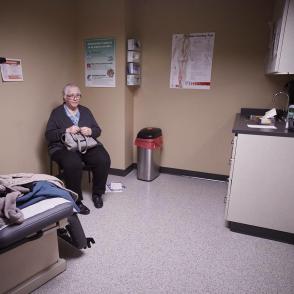
The Medicaid Equity Simulation Project is the online training services that created ELI. MESP uses virtual reality for all of its training to create health equity by educating students and professionals. The two trainings currently featured, Diabetes in Appalachia and Living with Addiction, follow the lives of Lula Mae and Destiny. The actresses and their struggles present trainees with difficult realities, so they can understand how to navigate different patient experiences in the real world.
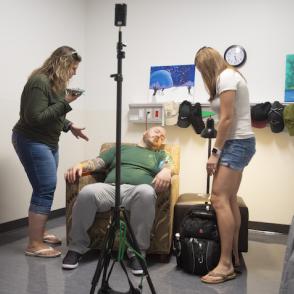
The Narcan Virtual Reality experience allows viewers a view into a college dorm room where two students find their friend experiencing an opioid overdose. In the scenes, the students call 9-1-1 and eventually must administer Narcan to save their friend’s life. Narcan was initially a simulation experience led by Sherleena Buchman, assistant professor in the College of Health Sciences and Professions’s School of Nursing. With the help of Eric Williams in the Scripps College of Communication, the GRID Lab transformed the project into a virtual reality experience. The experience became more interactive and accessible for students and faculty across campus.
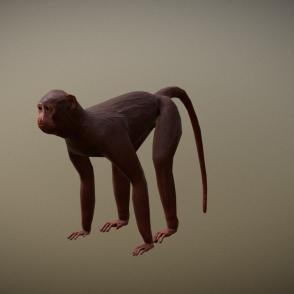
The Rukwa Rift is a virtual reality collaboration between the GRID Lab and the Paleontology department at Ohio University. The project identified the first mammal species, Galulatherium jenkinsi on all of the African continent dating back to the Late Cretaceous Period (100-66 million years ago). The jaw of the mammal, projected to be the size of a small squirrel, was found in Rukwa Rift Basin in southwestern Tanzania and has given researchers the opportunity to learn more about the African continent.
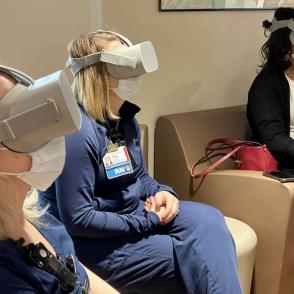
The Tranquil Virtual Reality experience was created to mitigate health care workers’ stress sparked throughout the coronavirus pandemic by placing them in nature. Matt Love, virtual reality production coordinator in the GRID Lab and Elizabeth Beverly, Associate Professor and Osteopathic Heritage Foundation Ralph S. Licklider, DO, worked together to create a peaceful virtual reality experience for health care workers. OhioHealth assisted in identifying hospitals in Columbus in need of TranquilVR. Headsets are now being used at Riverside Methodist Hospital, Grant Medical Central and Marion General Hospital. The experience lasts up to five minutes but workers can choose how long they want to participate.
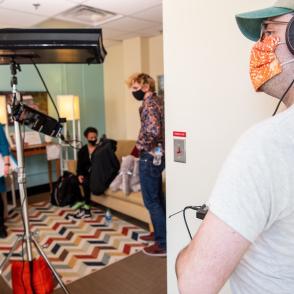
The GRID Lab is collaborating with the Dean of Students and the Ohio University Police Department to create two VR experiences that demonstrate how to advocate for students who may have suffered from sexual harassment, assault, dating violence, or stalking.
Our Cinematic Virtual Reality (cine-VR) team has been working with Dr. Patti McSteen, Dean of Students, and Detective Rick Sargent, Ohio University Police Department, to use 360-degree video to create two scenarios that demonstrate helpful ways to have positive conversations with students who may be in distress. Graduating seniors, Jake Haire, Kenzie Kress, and Sammy Lahiri, produced, directed, shot and edited the cine-VR experiences during the summer of 2021 under the guidance of McClure professor Eric R. Williams.
Completed in the fall of 2021, the experiences will be used during the school year to train faculty, staff and graduate students. One experience demonstrates empathic response in the classroom, while the other experience demonstrates a similar technique in the workplace.
Students requiring confidential services are encouraged to contact Ohio University’s Survivor Advocacy Program’s (SAP) or their Counseling and Psychological Services (CPS).
The Appalachian Law Enforcement Initiative (ALEI)
|
|